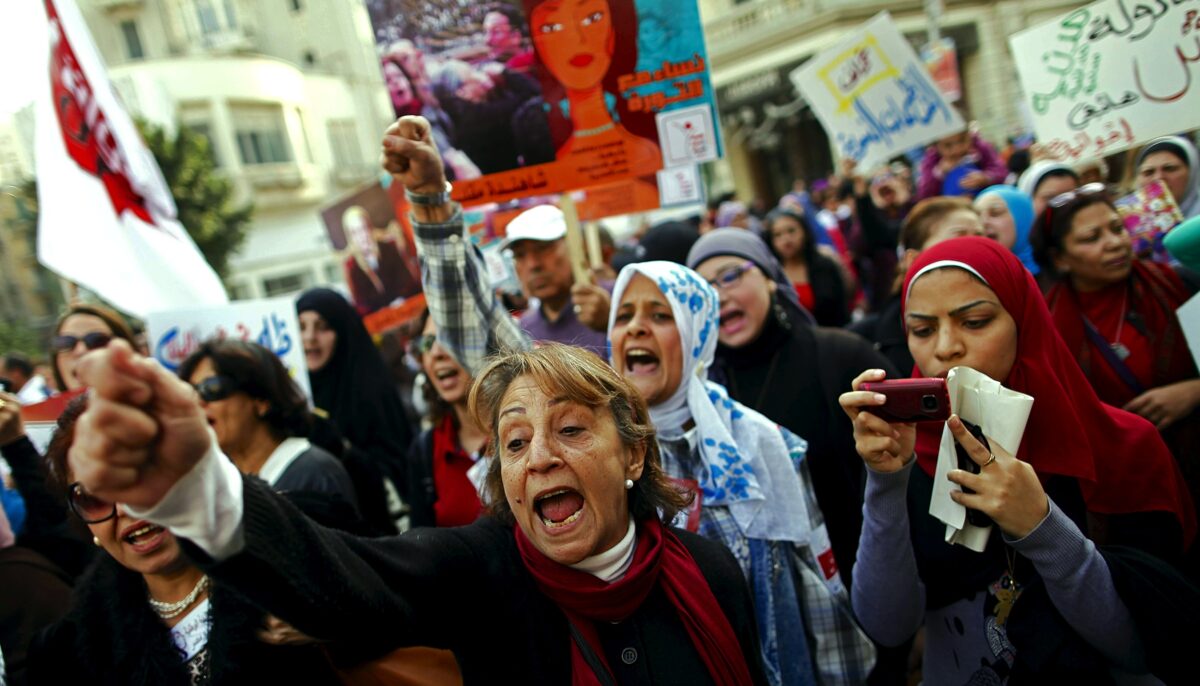“Mama, you have to believe me, I am not this girl. These photos are fake, I swear to God, Mama. I’m a young girl and I don’t deserve what’s happening to me. I’m very depressed. I can’t have any more of this. I’m tired, I’m suffocating.”
These were the last words of 16-year-old Basant Khaled, in her handwritten suicide note.
The Egyptian high school student committed suicide in December 2021 after a number of young men threatened to publish digitally-altered photos of her on the internet.
Although social media has provided a much-needed space for both women and men to share their experiences with sexual harassment in Egypt, it has rendered many, like Khaled, more vulnerable.
“In many cases, digital tools and social media helped film, monitor and report cases of harassment, while in other cases, it led to many girls getting hurt—some even lost their lives,” said Hala Mostafa, General coordinator of “I Saw Harassment” (or “Shoft Taharosh” in Arabic). “The mere presence of a prominent woman on social media exposes her to societal attacks, insults and a degree of violation to her private life.”
“I Saw Harassment” is one of several initiatives that use social media platforms and digital tools to monitor and document sexual harrasment in Egypt. However, unequal access to modern communication and information technologies between males (52.4 %) and females (41.3%) makes it difficult for many women to benefit from these interventions.
In the broader MENA region, around 63 million women are not using mobile internet. In addition to discriminative social norms, the top barriers to internet access were affordability, safety and security, and digital illiteracy, according to the Mobile Gender Report 2021.
Narrowing the digital gender gap
“Despite the success of different campaigns in raising awareness among women and girls about sexual harassment, the change is still limited because not everyone has access to online content,” explained Yasmine Hamdy, a volunteer with “I Saw Harassment.”
To narrow this gap, she suggests promoting the use of phone calls to report gender-based violence and providing free internet access for girls and women at schools and public libraries.
Nonetheless, Mostafa stressed that the solution is not only about equal digital access.
“We can’t separate gender-based violence and harassment from women empowerment in general,” she said. “Modern technology helps to economically empower women, allowing them greater freedom of movement and decision-making. This is what most Egyptian society opposes.”
Sexual harassment of women and girls in public spaces in Egypt is a wide-spread and almost a daily occurrence, as documented by several local and international studies. A 2020 survey by the Arab Parmeter found that 90% of women aged 18 to 29 and 44 % of all women reported being sexually harassed over a 12-month period.
Similarly, a 2017 Reuters survey, ranked Cairo as the most dangerous megacity for women in regards to sexual violence, harmful cultural practices, and access to good healthcare, finance and education.
Since the January 25 Revolution in Egypt, many volunteer-based initiatives worked to raise awareness, document, and report sexual violence and harassment while offering support to victims. Advocacy campaigns led to the issuance of the law Number 50 of 2014 in Egypt, in which the word “harassment” was explicitly mentioned for the first time.
Community initiatives stand up to harassment
Online campaigns to name and shame alleged perpetrators by initiatives such as Assault Police managed to expose repeated sexual assault by a college student in July 2020. Anonymous testimonials from survivors led to sentencing the accused to eight years in prison for sexual assault and blackmail of three underage girls.
Speak Up is another inatitiative that provides a safe space for survivors of sexual harassment to share their stories. The initiative managed to help several victims take legal action in sexual harrasment and rape cases, including the case of Michael Fahmy and his wife Sally Adel, who were accused of being serial rapists.
Other initiatives, such as HARASSmap and StreetPal, focus on interactive mapping and encouraging passers to stand up to sexual harrasment when they witness it in public.
Such initiatives provided a much needed sense of empowerment and safety for women in public places. According to a survey conducted in Bolivia, Kenya, Egypt and India, women and girls feel more secure and independent when they have their mobile phones in public spaces, as a measure of protection against harassment.
However, since 2014, the Egyptian government has been taking escalatory measures against civil society organizations, prompting some human rights organizations and centers to reduce their work. Using several legal tools and judicial procedures, the government limited the ability of civil society organizations to organize public events or convene. The restrictions to work on the ground lead most initiatives to move their work to the virtual space.
This shift facilitated communication between victims and specialized organizations, and it helped more women report sexual harassment while avoiding the stigma and shame that usually accompany the process of reporting such violations.
Countering the official story
Moreover, the cyberspace provided an alternative venue for bloggers and activists to counter the arguments repeated by official media regarding sexual harassment, which blames the victim for the choice of clothes and her behaviour in public settings.
Amel Fahmy, Managing Director and Founder of Tadwein Center for Gender Studies, believes that social media is a very effective tool for wide dissemination of information due to its low cost and high penetration rate. This allows civil society organizations to have more presence on these platforms and create attractive content suitable for its users.
“Social media is a golden opportunity, despite the digital gender gap, which is not very big in Egypt’s case anyway,” she said. “What’s trending on social media is now being discussed on TV channels, allowing the campaigns to reach more people and have a significant impact on shaping public perceptions and public opinion.”
Seeking help
Reporting incidents of online harassment to the Cybercrime and Data Networks Unit, more widely known as the Internet Investigative Authorities (IIA), is one way of seeking litigation and help.
Both Fahmy and Mostafa agree that the IIA is doing a good job in responding to such incidents. The challenge is that many victims are unaware of the reporting process.
Filing a case of cyber harassment is a straightforward process that requires the affected individual to visit the Internet Investigative Authorities’ main office in El-Abbasiya, Cairo or any of its other stations in Assiut, Sohag, El-Menya, El-Monofeya, Tanta, and Damietta. They can also file a case through the dedicated hotline: 108.
As more young feminist groups are taking to the digital space to combat gender-based violence without prior field experience, social media is becoming a powerful empowerment tool for women and a space for addressing sensitive topics, explained Fahmy.
“The makeup of work on harassment issues is changing. Now, it’s important to shift our focus to the opportunity social media provides for these young feminist movements, how to make the content we offer more gender sensitive, and how to make these virtual spaces safer for women.”
Feature image via AFP.



